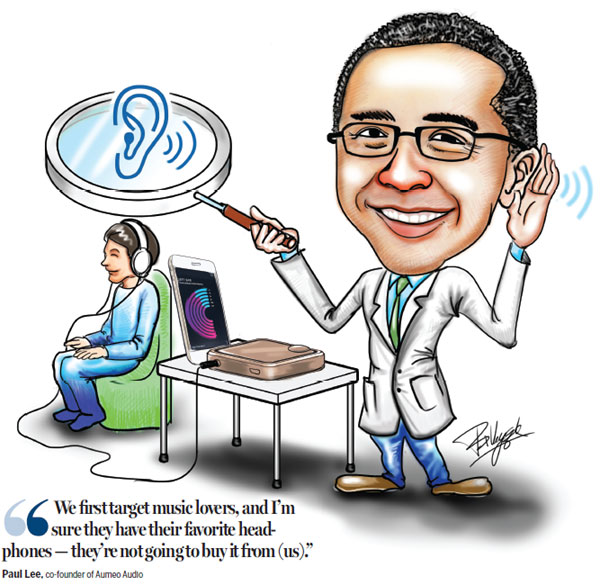So, just sit back, it's all tailored to your ears
Updated: 2015-12-24 07:51
By Deng Yanzi in Hong Kong(HK Edition)
|
|||||||

Editor's note: A pocket-sized device aimed at catering to the different ear receptions of music lovers and audiophiles is in the making, with a Hong Kong startup aiming to transform an award-winning audio technology into a product that will appeal to consumers worldwide.
For music enthusiasts and audiophiles, attempts at perfect music enjoyment usually include pricier audio devices or higher-resolution file formats, but Hong Kong startup Aumeo Audio would like to remind them of a measurement they've missed - the ears.
The company points out that people hear sounds differently, which nuances the music they actually hear. As a solution, it has developed a device called Aumeo, which fine-tunes the music based on individual variations with a new concept dubbed "tailored audio".
"We found out the gap in hearing, put it back into the equation, and that's how you can hear the true intention of the song," Paul Lee, co-founder and chief executive officer of Aumeo Audio, explains to China Daily.
After a one-time hearing test on the smartphone app to measure the sensitivity of both ears to different frequencies of sounds, the Aumeo device will alter the sound, aiming for an original and balanced level, based on the user's profile. The pocket-sized device makes a noticeable difference to the music the user is hearing.
Also, Lee says a more balanced output allows the listener to hear clearly at a lower volume, which could protect the hearing.

Connected to smartphones, PCs or speakers via bluetooth or a cable, the device can tweak the sound output of music, phone calls, movies, games and more.
The award-winning "tailored audio" technology is the brainchild of Charles Andrew van Hasselt, an internationally acclaimed otologist and chairman of the Department of Otorhinolaryngology, Head and Neck Surgery at the Chinese University of Hong Kong.
Connected by Lee's childhood friend in late 2009, the duo decided to transform the scientific achievements of van Hasselt, now the co-founder and chief inventor of Aumeo, into consumer products.
Currently, the Aumeo team has eight people working at IoT (Internet of Things) accelerator Brinc and Hong Kong Science Park.
According to scientific research, like eyesight, the ability to hear differs from person to person, even for normal-hearing listeners, due to factors such as individual variations in the ear structure, past exposure to sound, age and gender.
However, people are not as keen to correct their hearing as they wear glasses for their eyes.
The variations are subtle and hard to measure, and people can function through life normally even if they do not hear everything, says Lee.
The device, priced at $199 for retail, is "not an instant buy", Lee says, adding he plans to appeal globally to audiophiles and music enthusiasts, who are more likely to take time to experiment with the new concept.
The good news for Lee is that this group is increasingly craving, and spending more, for better sound quality, market intelligence shows.
Nine out of 10 consumers with interest in audio say sound quality is the most important in a quality audio experience, and nearly four out of 10 consumers are willing to pay more for high-quality audio electronic devices, according to a 2013 research by the Consumer Technology Association (CTA) of the US.
The most frequently purchased audio devices, according to CTA's latest study, are headphones.
The market for premium headphones, which costs more than $100 each, had surpassed $1 billion in the US in 2013, while the overall headphone market was worth $2.3 billion, according to US-based market research firm NPD Group.
With a lucrative market, Aumeo Audio could have made a headphone with its audio technology, but Lee, a Silicon Valley veteran, does not think it was wise at the moment to join the crowded marketplace and rival big names like Beats, Bose and Sennheiser.
"We first target music lovers, and I'm sure they have their favorite headphones - they're not going to buy it from Paul," he jokes, stressing that Aumeo Audio works to "complement" the user's existing devices.
But the duo is eyeing a headphone further down the roadmap when the brand grows stronger.
In the initial stages, the team sought to incorporate the technology into headphones or speakers in early 2010 when they started the development. However, the lack of public awareness pulled back audio equipment makers they had approached.
"I spent two years talking to manufacturers and, at some point, it struck me. Everyone was interested, but no one was brave enough or felt it easy to market it," Lee recalls.
In 2013, instead of licensing the technology, Aumeo Audio decided to make its own device. The company is now in the final stages of producing the device and expects to deliver the products in January to nearly 2,500 backers from their crowdfunding campaign around the world.
While admitting it would be a challenging task to educate the market, Lee is optimistic that it has opened up opportunities for startups like Aumeo to become a leader in the new category.
"I see it's good that it's hard to communicate or break through to the general public. This is a brick wall, but the same brick wall that makes it hard will also separate the blue ocean from the red ocean," Lee says.
"So yes, there's a challenge, and I happily accept that challenge."
iris@chinadailyhk.com
(HK Edition 12/24/2015 page8)